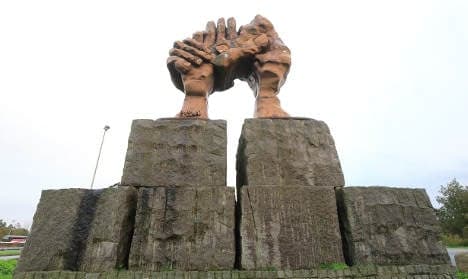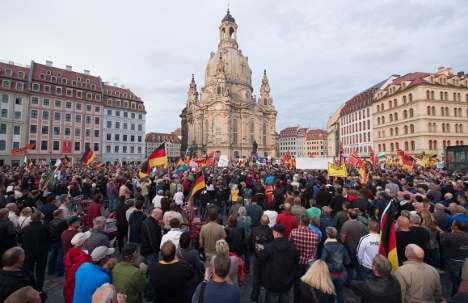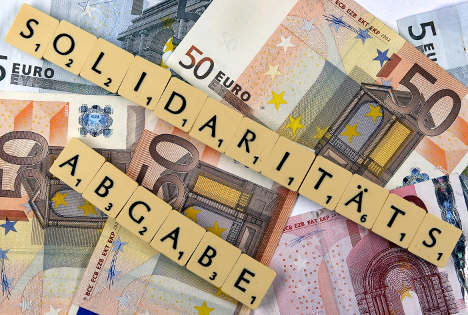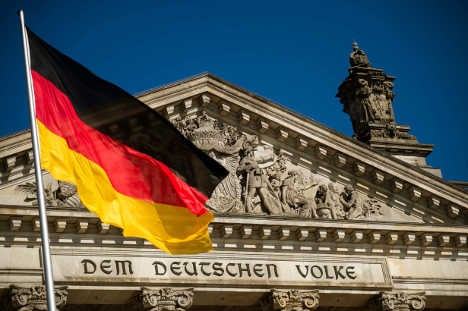What if Germany had never been reunited?

German reunification has been an expensive 25-year project that hasn't always gone according to plan. Jörg Luyken asks if things would have been better if the two states never united.
Despite joyous celebrations of the 25 year anniversary of the fall of the Berlin wall, and what is set to be a star-studded reunification day, the former German Democratic Republic (GDR) has been hitting the headlines over the past 11 months for all the wrong reasons.
Pegida, a fear-mongering, xenophobic protest movement from Dresden swept tens of thousands of people onto the streets. Neo-Nazis blockaded refugees homes and set them on fire. The trial of an east German terror cell which murdered migrants over a decade rumbles on in Munich.
But perhaps it's not so surprising that east Germans are unhappy. The population is aging and poorer than their western cousins.
The 'new states', as the former east is colloquially know, have been robbed of a middle class, which fled to the west in the 90s. Outside of hip east Berlin, green shoots of rejuvenation are hard to find.
Germany has also been making international headlines over the past year - and the results give serious pause for thought.
Berlin is being accused of using its economic muscle to bully European allies. Tough negotiating on Greek debt - and even its refugee policies - have created a level of resentment unheard of in the post-war decades.
So it's reasonable to ask whether reunification was such a good idea after all - and what they alternative might have looked like.

Pegida demonstrators in Dresden. Photo: DPA
Germany without solidarity
One thing is clear. If reunification had never happened, West Germany would have a lot more money in its pocket a quarter century down the line.
Experts estimate that between €1.5 trillion and €2 trillion has flowed from the 'old states' into the new ones in state subsidies - that's somewhere approaching half the annual GDP of the whole of Germany.
Dr. Jochen Staadt, head of the Free University in Berlin's research team on the German Democratic Republic (GDR) told The Local that "West Germany was rich anyway, but it would most likely be even richer now."
This is a view reflected by Henrik Müller, professor of Journalism at the Technical University in Dortmund.
Writing in Spiegel last week, Müller said "one can confidently predict that public debt and private taxes would have been lower."
All Germans pay what is known as the 'solidarity tax', a 5.5 percent tax on income which goes to the new states. Without reunification west Germans could have spent the proceeds of the 'Soli' at home, or been spared it outright.

'Solidarity payments'. Photo: DPA
But that money didn't disappear into a black hole. It went into building up the decrepit infrastructure in the east.
Without it, Staadt argues, the east would have struggled to survive.
"Industry would not have been able to compete with the west and there weren't the financial resources to invest in modernizing it," he argues.
For the Berlin professor, the continued existence of the GDR would have been a disaster.
"If East Germany had remained a separate country it would have been depopulated,“ he states.
"What happened is that three million people left, but if it had remained a reformed socialist state we would be talking about three times that number."
"People wouldn't have thought 'We'll wait 15 or 20 years until thing gets better.' They were already fed up waiting."
As for racism in the former east, this he says is a legacy of the GDR, not a consequence of failed post-reunification policies.
But Dortmund University's Müller believes the GDR could have gone it alone.
"The industrial sector [in the GDR] would have been supported by a cheap currency in adjusting to the new conditions. As soon as a self-sustaining economic growth was achieved many of the east Germans who had emigrated would have moved back,“ he asserts.
But he acknowledges that the risk would have been higher and questions whether Russian troops would have been so easy to remove had the GDR continued to exist.
A more stable Europe?

Is Germany too strong now both sides are ruled from Berlin? Photo: DPA
Italy's Prime Minister Giulio Andreotti quipped in 1990 that he liked Germany so much he preferred to see two of them. Many politicians of the time feared German domination of Europe.
A consequence of this fear was the creation of the Euro, which was created to try and counteract German dominance of Europe, Müller writes. But that plan has backfired.
In a Europe without the single currency, smaller countries would have been able to devalue their money in the wake of the economic crash of 2008. Greece could have picked its own course out of the crisis rather than being beholden to Germany's strict economic playbook.
Müller also argues that reunification set a precedent which is eroding the foundations of the EU from the bottom.
By legitimizing nationalism, it "blew wind into the sails of the nationalist idea“ leading to Scottish and Catalonia independence struggles taking place today, he says.
Without reunification, Germany would have chosen the path of a federal Europe where continental institutions were more important than ethnic nationalism.
Staadt agrees that united Germany has a serious image problem in eastern Europe. It is seen as "too influential and too much of a school teacher."
But he questions whether an independent GDR would have been more sympathetic to the sensitivities of the former east bloc.
"The East Germans always saw themselves as something different, something better than the rest of the eastern bloc."
He points out that Chancellor Angela Merkel's experience growing up in the GDR has given her no particular sensitivity to the worries of Poland, Hungary and co.
Everything was better then?
But, aside from the speculation on whether no reunification would have been better, there is one fundamental flaw in the thought experiment.
The GDR had no democratic legitimacy. Only around 14 percent of East Germans in 1990 voted for parties that supported that maintenance of the socialist state. In the West, the Green Party were the only party that explicitly rejected unification and they were voted out of parliament.
Meanwhile today the idea holds even less sway - only three percent of east Germans say they would like to live in a separate state.
But that doesn't mean east Germans reject everything a continuity GDR could have represented.
"Surveys show that east Germans miss values that existed in the GDR, but that they don't miss the system that implemented them," says Staadt.
The poorer eastern population still holds onto the socialist notion of equality, whereas the west prizes freedom.
The continued disparity in wealth and living standards is "unjustifiable" says Staadt.
But believing that an independent East would have been better off? That's just wishful thinking.
Comments
See Also
Despite joyous celebrations of the 25 year anniversary of the fall of the Berlin wall, and what is set to be a star-studded reunification day, the former German Democratic Republic (GDR) has been hitting the headlines over the past 11 months for all the wrong reasons.
Pegida, a fear-mongering, xenophobic protest movement from Dresden swept tens of thousands of people onto the streets. Neo-Nazis blockaded refugees homes and set them on fire. The trial of an east German terror cell which murdered migrants over a decade rumbles on in Munich.
But perhaps it's not so surprising that east Germans are unhappy. The population is aging and poorer than their western cousins.
The 'new states', as the former east is colloquially know, have been robbed of a middle class, which fled to the west in the 90s. Outside of hip east Berlin, green shoots of rejuvenation are hard to find.
Germany has also been making international headlines over the past year - and the results give serious pause for thought.
Berlin is being accused of using its economic muscle to bully European allies. Tough negotiating on Greek debt - and even its refugee policies - have created a level of resentment unheard of in the post-war decades.
So it's reasonable to ask whether reunification was such a good idea after all - and what they alternative might have looked like.

Pegida demonstrators in Dresden. Photo: DPA
Germany without solidarity
One thing is clear. If reunification had never happened, West Germany would have a lot more money in its pocket a quarter century down the line.
Experts estimate that between €1.5 trillion and €2 trillion has flowed from the 'old states' into the new ones in state subsidies - that's somewhere approaching half the annual GDP of the whole of Germany.
Dr. Jochen Staadt, head of the Free University in Berlin's research team on the German Democratic Republic (GDR) told The Local that "West Germany was rich anyway, but it would most likely be even richer now."
This is a view reflected by Henrik Müller, professor of Journalism at the Technical University in Dortmund.
Writing in Spiegel last week, Müller said "one can confidently predict that public debt and private taxes would have been lower."
All Germans pay what is known as the 'solidarity tax', a 5.5 percent tax on income which goes to the new states. Without reunification west Germans could have spent the proceeds of the 'Soli' at home, or been spared it outright.

'Solidarity payments'. Photo: DPA
But that money didn't disappear into a black hole. It went into building up the decrepit infrastructure in the east.
Without it, Staadt argues, the east would have struggled to survive.
"Industry would not have been able to compete with the west and there weren't the financial resources to invest in modernizing it," he argues.
For the Berlin professor, the continued existence of the GDR would have been a disaster.
"If East Germany had remained a separate country it would have been depopulated,“ he states.
"What happened is that three million people left, but if it had remained a reformed socialist state we would be talking about three times that number."
"People wouldn't have thought 'We'll wait 15 or 20 years until thing gets better.' They were already fed up waiting."
As for racism in the former east, this he says is a legacy of the GDR, not a consequence of failed post-reunification policies.
But Dortmund University's Müller believes the GDR could have gone it alone.
"The industrial sector [in the GDR] would have been supported by a cheap currency in adjusting to the new conditions. As soon as a self-sustaining economic growth was achieved many of the east Germans who had emigrated would have moved back,“ he asserts.
But he acknowledges that the risk would have been higher and questions whether Russian troops would have been so easy to remove had the GDR continued to exist.
A more stable Europe?

Is Germany too strong now both sides are ruled from Berlin? Photo: DPA
Italy's Prime Minister Giulio Andreotti quipped in 1990 that he liked Germany so much he preferred to see two of them. Many politicians of the time feared German domination of Europe.
A consequence of this fear was the creation of the Euro, which was created to try and counteract German dominance of Europe, Müller writes. But that plan has backfired.
In a Europe without the single currency, smaller countries would have been able to devalue their money in the wake of the economic crash of 2008. Greece could have picked its own course out of the crisis rather than being beholden to Germany's strict economic playbook.
Müller also argues that reunification set a precedent which is eroding the foundations of the EU from the bottom.
By legitimizing nationalism, it "blew wind into the sails of the nationalist idea“ leading to Scottish and Catalonia independence struggles taking place today, he says.
Without reunification, Germany would have chosen the path of a federal Europe where continental institutions were more important than ethnic nationalism.
Staadt agrees that united Germany has a serious image problem in eastern Europe. It is seen as "too influential and too much of a school teacher."
But he questions whether an independent GDR would have been more sympathetic to the sensitivities of the former east bloc.
"The East Germans always saw themselves as something different, something better than the rest of the eastern bloc."
He points out that Chancellor Angela Merkel's experience growing up in the GDR has given her no particular sensitivity to the worries of Poland, Hungary and co.
Everything was better then?
But, aside from the speculation on whether no reunification would have been better, there is one fundamental flaw in the thought experiment.
The GDR had no democratic legitimacy. Only around 14 percent of East Germans in 1990 voted for parties that supported that maintenance of the socialist state. In the West, the Green Party were the only party that explicitly rejected unification and they were voted out of parliament.
Meanwhile today the idea holds even less sway - only three percent of east Germans say they would like to live in a separate state.
But that doesn't mean east Germans reject everything a continuity GDR could have represented.
"Surveys show that east Germans miss values that existed in the GDR, but that they don't miss the system that implemented them," says Staadt.
The poorer eastern population still holds onto the socialist notion of equality, whereas the west prizes freedom.
The continued disparity in wealth and living standards is "unjustifiable" says Staadt.
But believing that an independent East would have been better off? That's just wishful thinking.
Join the conversation in our comments section below. Share your own views and experience and if you have a question or suggestion for our journalists then email us at [email protected].
Please keep comments civil, constructive and on topic – and make sure to read our terms of use before getting involved.
Please log in here to leave a comment.